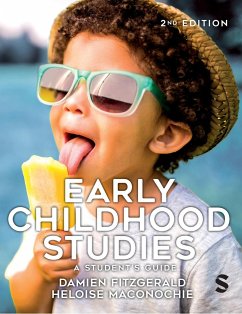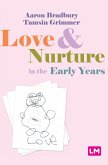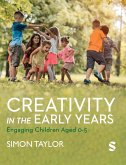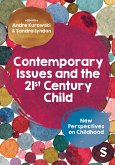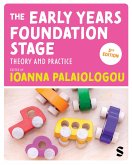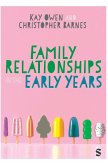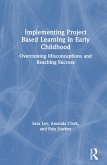Early Childhood Studies
Herausgeber: Fitzgerald, Damien; Maconochie, Heloise
Early Childhood Studies
Herausgeber: Fitzgerald, Damien; Maconochie, Heloise
- Gebundenes Buch
- Merkliste
- Auf die Merkliste
- Bewerten Bewerten
- Teilen
- Produkt teilen
- Produkterinnerung
- Produkterinnerung
The only textbook yoüll need to support you through your entire Early Childhood Studies degree. This updated edition is comprehensive and current, with student voices in every chapter.
Andere Kunden interessierten sich auch für
![Love and Nurture in the Early Years Love and Nurture in the Early Years]() Aaron BradburyLove and Nurture in the Early Years75,99 €
Aaron BradburyLove and Nurture in the Early Years75,99 €![Creativity in the Early Years Creativity in the Early Years]() Simon TaylorCreativity in the Early Years76,99 €
Simon TaylorCreativity in the Early Years76,99 €![Contemporary Issues and the 21st Century Child Contemporary Issues and the 21st Century Child]() Contemporary Issues and the 21st Century Child98,99 €
Contemporary Issues and the 21st Century Child98,99 €![The Early Years Foundation Stage The Early Years Foundation Stage]() The Early Years Foundation Stage121,99 €
The Early Years Foundation Stage121,99 €![Family Relationships in the Early Years Family Relationships in the Early Years]() Family Relationships in the Early Years98,99 €
Family Relationships in the Early Years98,99 €![Early Literacy For Under-Fives Early Literacy For Under-Fives]() Karen BoardmanEarly Literacy For Under-Fives91,99 €
Karen BoardmanEarly Literacy For Under-Fives91,99 €![Implementing Project Based Learning in Early Childhood Implementing Project Based Learning in Early Childhood]() Sara LevImplementing Project Based Learning in Early Childhood115,99 €
Sara LevImplementing Project Based Learning in Early Childhood115,99 €-
-
-
The only textbook yoüll need to support you through your entire Early Childhood Studies degree. This updated edition is comprehensive and current, with student voices in every chapter.
Hinweis: Dieser Artikel kann nur an eine deutsche Lieferadresse ausgeliefert werden.
Hinweis: Dieser Artikel kann nur an eine deutsche Lieferadresse ausgeliefert werden.
Produktdetails
- Produktdetails
- Verlag: SAGE Publications Ltd
- 2. Auflage
- Seitenzahl: 424
- Erscheinungstermin: 27. Januar 2024
- Englisch
- Abmessung: 241mm x 196mm x 27mm
- Gewicht: 981g
- ISBN-13: 9781529794908
- ISBN-10: 1529794900
- Artikelnr.: 68581128
- Herstellerkennzeichnung
- Libri GmbH
- Europaallee 1
- 36244 Bad Hersfeld
- gpsr@libri.de
- Verlag: SAGE Publications Ltd
- 2. Auflage
- Seitenzahl: 424
- Erscheinungstermin: 27. Januar 2024
- Englisch
- Abmessung: 241mm x 196mm x 27mm
- Gewicht: 981g
- ISBN-13: 9781529794908
- ISBN-10: 1529794900
- Artikelnr.: 68581128
- Herstellerkennzeichnung
- Libri GmbH
- Europaallee 1
- 36244 Bad Hersfeld
- gpsr@libri.de
Part 1: THE INDIVIDUAL CHILD
Chapter 1: The emergence of Early Childhood Studies: an historic overview
Chapter 2: The brain and children¿s early development
Chapter 3: The social and emotional development of children aged birth to
three
Chapter 4: How Young Children Learn
Chapter 5: Creativity, curiosity and resilience
Chapter 6: Young children and early communication
Chapter 7: Developing children as critical Thinkers
Chapter 8: Family relationships in the early years
Chapter 9: Play in early childhood
Part 2: CHILDREN IN SOCIETY: ACCESS AND OPPORTUNITY FOR ALL
Chapter 10: Diversity, equity, and inclusion
Chapter 11: Children with Special Educational Needs and Disabilities (SEND)
Chapter 12: Young children's rights: provision, protection and
participation
Chapter 13: Children's health
Chapter 14: Early years policy: implementation and impact
Chapter 15: Safeguarding children
Chapter 16: Young children's wellbeing: conceptualising, assessing and
supporting wellbeing
Chapter 17: Working with multilingual children and families in the early
years
Part 3: CREATING ENVIRONMENTS FOR CHILDREN TO THRIVE
Chapter 18: Multi-agency practice with young children
Chapter 19: Childhood in a global context
Chapter 20: Young Children, Childhood and Gender
Chapter 21: Technology and early digital culture
Chapter 22: Observing and assessing children
Chapter 23: Researching with children
Chapter 24: Learning through placements
Chapter 25: Leading quality practice
Chapter 1: The emergence of Early Childhood Studies: an historic overview
Chapter 2: The brain and children¿s early development
Chapter 3: The social and emotional development of children aged birth to
three
Chapter 4: How Young Children Learn
Chapter 5: Creativity, curiosity and resilience
Chapter 6: Young children and early communication
Chapter 7: Developing children as critical Thinkers
Chapter 8: Family relationships in the early years
Chapter 9: Play in early childhood
Part 2: CHILDREN IN SOCIETY: ACCESS AND OPPORTUNITY FOR ALL
Chapter 10: Diversity, equity, and inclusion
Chapter 11: Children with Special Educational Needs and Disabilities (SEND)
Chapter 12: Young children's rights: provision, protection and
participation
Chapter 13: Children's health
Chapter 14: Early years policy: implementation and impact
Chapter 15: Safeguarding children
Chapter 16: Young children's wellbeing: conceptualising, assessing and
supporting wellbeing
Chapter 17: Working with multilingual children and families in the early
years
Part 3: CREATING ENVIRONMENTS FOR CHILDREN TO THRIVE
Chapter 18: Multi-agency practice with young children
Chapter 19: Childhood in a global context
Chapter 20: Young Children, Childhood and Gender
Chapter 21: Technology and early digital culture
Chapter 22: Observing and assessing children
Chapter 23: Researching with children
Chapter 24: Learning through placements
Chapter 25: Leading quality practice
Part 1: THE INDIVIDUAL CHILD
Chapter 1: The emergence of Early Childhood Studies: an historic overview
Chapter 2: The brain and children¿s early development
Chapter 3: The social and emotional development of children aged birth to
three
Chapter 4: How Young Children Learn
Chapter 5: Creativity, curiosity and resilience
Chapter 6: Young children and early communication
Chapter 7: Developing children as critical Thinkers
Chapter 8: Family relationships in the early years
Chapter 9: Play in early childhood
Part 2: CHILDREN IN SOCIETY: ACCESS AND OPPORTUNITY FOR ALL
Chapter 10: Diversity, equity, and inclusion
Chapter 11: Children with Special Educational Needs and Disabilities (SEND)
Chapter 12: Young children's rights: provision, protection and
participation
Chapter 13: Children's health
Chapter 14: Early years policy: implementation and impact
Chapter 15: Safeguarding children
Chapter 16: Young children's wellbeing: conceptualising, assessing and
supporting wellbeing
Chapter 17: Working with multilingual children and families in the early
years
Part 3: CREATING ENVIRONMENTS FOR CHILDREN TO THRIVE
Chapter 18: Multi-agency practice with young children
Chapter 19: Childhood in a global context
Chapter 20: Young Children, Childhood and Gender
Chapter 21: Technology and early digital culture
Chapter 22: Observing and assessing children
Chapter 23: Researching with children
Chapter 24: Learning through placements
Chapter 25: Leading quality practice
Chapter 1: The emergence of Early Childhood Studies: an historic overview
Chapter 2: The brain and children¿s early development
Chapter 3: The social and emotional development of children aged birth to
three
Chapter 4: How Young Children Learn
Chapter 5: Creativity, curiosity and resilience
Chapter 6: Young children and early communication
Chapter 7: Developing children as critical Thinkers
Chapter 8: Family relationships in the early years
Chapter 9: Play in early childhood
Part 2: CHILDREN IN SOCIETY: ACCESS AND OPPORTUNITY FOR ALL
Chapter 10: Diversity, equity, and inclusion
Chapter 11: Children with Special Educational Needs and Disabilities (SEND)
Chapter 12: Young children's rights: provision, protection and
participation
Chapter 13: Children's health
Chapter 14: Early years policy: implementation and impact
Chapter 15: Safeguarding children
Chapter 16: Young children's wellbeing: conceptualising, assessing and
supporting wellbeing
Chapter 17: Working with multilingual children and families in the early
years
Part 3: CREATING ENVIRONMENTS FOR CHILDREN TO THRIVE
Chapter 18: Multi-agency practice with young children
Chapter 19: Childhood in a global context
Chapter 20: Young Children, Childhood and Gender
Chapter 21: Technology and early digital culture
Chapter 22: Observing and assessing children
Chapter 23: Researching with children
Chapter 24: Learning through placements
Chapter 25: Leading quality practice

